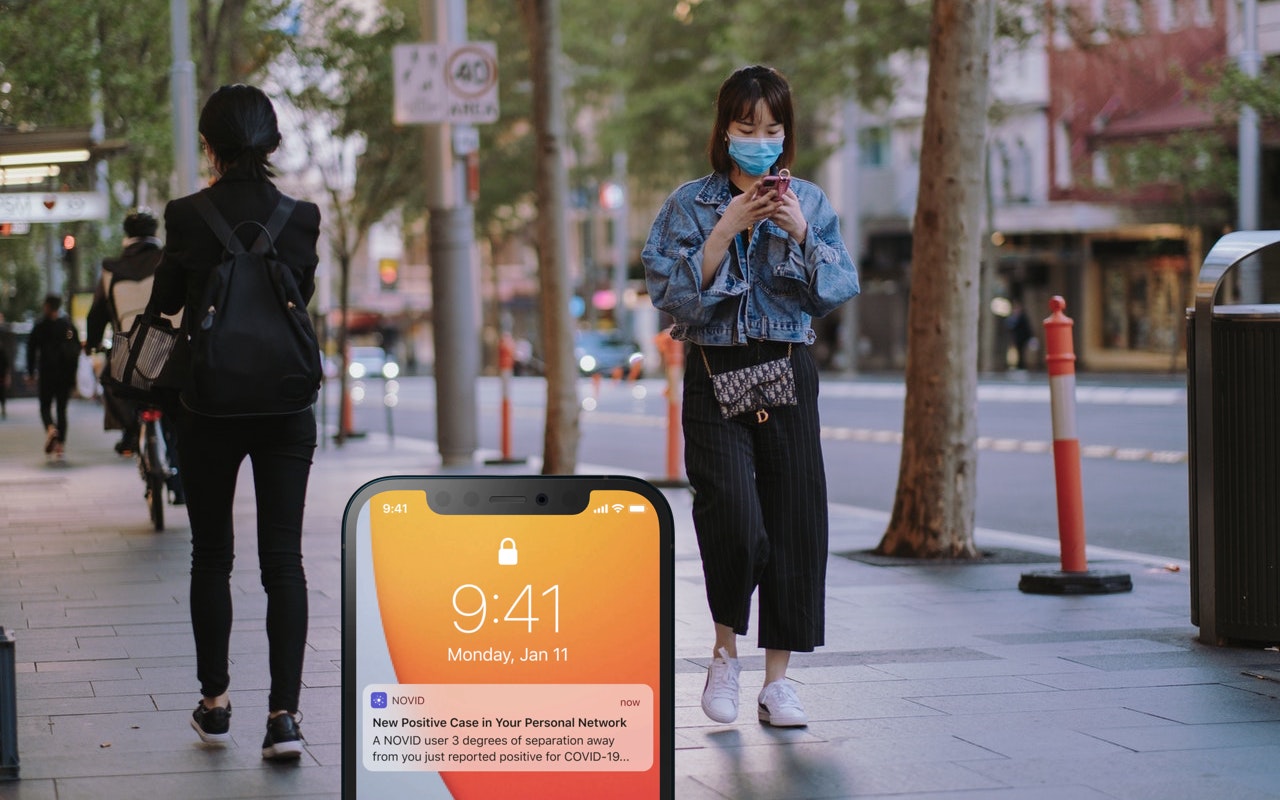With vaccinations underway, there’s light at the end of the COVID-19 pandemic tunnel. But given the enormity of the task and the unknowns surrounding coronavirus variants, we’ll still be in this tunnel for some time to come. Happily, there’s a new app called NOVID that, if you and your friends (and their friends, etc.) install it, provides early warning as COVID-19 infections creep closer in your personal network of connections. It’s like weather radar for disease.
Developed by a Carnegie Mellon University math professor, NOVID is a free app for iOS and Android that relies on roughly the same smartphone proximity detecting technique as the Apple/Google exposure notification technology. If your phone can use Wi-Fi, Bluetooth, or ultrasound to detect another nearby phone with NOVID installed, the two phones record that completely anonymous interaction.
However, where the Apple/Google technology notifies you only if you have been directly exposed at some point in the past, forcing you to quarantine and get tested, NOVID helps you look into the future and evaluate your personal risk of being infected. That’s because the Apple/Google technology stops at 1 degree of separation—you only learn about exposures to people with whom you have directly interacted, and only well after the fact. NOVID goes way beyond that, tracking infections out to 12 degrees of separation and showing you how far away they are.

Think about what that means. If a friend’s father gets sick, you probably wouldn’t hang out with your friend until it was certain that she wasn’t also infected. That’s 2 degrees of separation. Imagine 3 degrees of separation—another friend’s spouse works in an office where a colleague tested positive. That still feels pretty close, and you’d probably take more precautions than normal with your friend.
Beyond 3 degrees of separation, however, it’s unlikely you’d ever know about infections. Plus, you would only learn about infections that are 2 or 3 degrees of separation away from you if everyone involved knows each other. What if that 3rd-degree infection was a guy at a bar that an appliance repair person chatted with several nights before fixing your friend’s dishwasher? That’s where anonymous smartphone proximity sensing comes in.
NOVID solves these problems by building your network of personal interactions out to 12 degrees of separation, showing you both how many connections and how many infections are at each level of your network. As infections get closer, you can take more precautions to reduce your chances of being exposed to the coronavirus.

What’s most fun about NOVID is that its statistics show it working. It tells you how many other NOVID users you meet each day, and tapping the graph even tells you how NOVID detected their presence (ultrasound is more accurate than Bluetooth, and Bluetooth is more accurate than Wi-Fi).

NOVID also provides some community-level statistics if users choose to provide the first three digits of their ZIP codes. You can see how many people are in your greater ZIP code, how many cases are in the community, the size of the average user’s network, and even the iOS versus Android breakdown.

The key to making NOVID useful is adoption, so here’s our pitch. Install NOVID and ask a couple of friends or family members with whom you come into contact to do so as well. Then ask them to encourage a few of their friends or family members to install it and keep recommending it. Think of it as an early warning system that leverages the same kind of person-to-person transmission exploited by the coronavirus itself. And if a city—like Santa Fe—or a college campus—like Georgia Tech—were to recommend NOVID more broadly, that would be a super-spreader event on the positive side of the balance sheet!
We’ve all installed NOVID. Will you join us in building a network for community-wide early warning of approaching COVID-19 infections?
(Featured image based on an original by Kate Trifo from Pexels)



